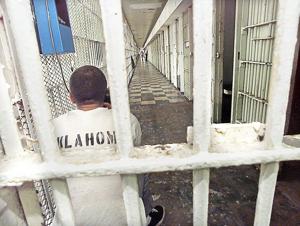OKLAHOMA CITY — Four criminal justice reform measures were signed into law by Gov. Mary Fallin on Wednesday.
The action comes at a time when the state’s prison system is operating at 122 percent of capacity.
“We want to be tough on crime, but we want to be smart on crime,” Fallin said.
The criminal justice reform bills she signed Wednesday are:
- House Bill 2472, which gives prosecutors discretion to file charges for crimes that are not subject to the 85 percent rule as misdemeanors instead of felonies. The 85 percent rules requires that those convicted of certain crimes, including rape and murder, serve at least 85 percent of their sentences before they can be considered for release.
- HB 2479, which reduces the mandatory minimum sentence for drug offenders charged only with possession.
- HB 2751, which raises the threshold for property crimes classified as felonies to $1,000 from $500.
- HB 2753, which would broaden defendants’ eligibility for drug courts and community sentencing.
The measures are designed to curb the growing prison population.
“These measures are just the beginning,” said Rep. Pam Peterson, R-Tulsa, the House author of the bills.
Fallin said it costs just under $20,000 a year to incarcerate an offender and about $5,000 a year for one defendant in drug court.
House Speaker Jeff Hickman, R-Fairview, said the state still has a crisis in corrections and incarceration.
“This is not the end of the mission,” he said, adding that other criminal justice reform bills are working their way through the legislative process.
Former Tulsa County District Attorney Tim Harris attended the bill signing in the Blue Room at the Capitol.
The measures give the state more options to prevent Oklahomans from becoming convicted felons and help them get the treatment they need, Harris said.
“It is not soft on crime,” he said. “It holds criminals accountable without breaking the bank. It is cost neutral to the taxpayer right now.”
Oklahoma County District Attorney David Prater said the state needs to take steps to move mental health and substance abuse treatment to the front end.
“With measures like this, I do believe that ultimately we will see a decrease in the prison population while not increasing violent crime, and actually this will have a positive impact, I believe ultimately, on public safety,” Prater said.
Earlier this week Fallin signed House Bill 1697, which allows for court-ordered outpatient treatment of certain adults with severe mental illnesses. The new law is called the “Labor Commissioner Mark Costello Act.”
Costello was killed last year while visiting with his son, Christian Costello, at a Braum’s restaurant in Oklahoma City. Christian Costello, who family members said has a history of mental illness, was arrested in connection with the stabbing death of his father.
Fallin also signed HB 2275, which allows for the collection of a DNA sample from a suspect upon arrest for a felony offense. The samples are to be destroyed if the charges are dismissed or the person is not convicted.
The governor also signed HB 2595, which allows courts to consider a veteran’s diagnosis of post-traumatic stress disorder connected to military service when making sentencing decisions.
In addition, she signed HB 2450, which increases the fine to $1,000 from $100 for those who impersonate a service member or veteran with the intent to deceive.
Barbara Hoberock 405-528-2465

No comments:
Post a Comment